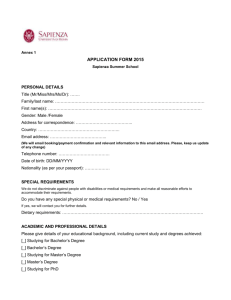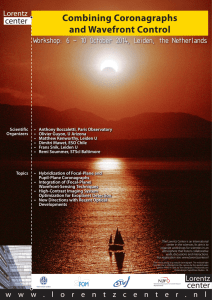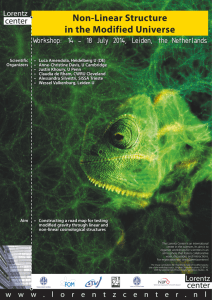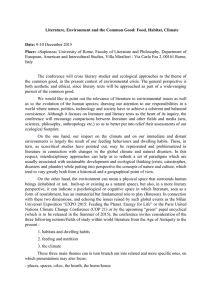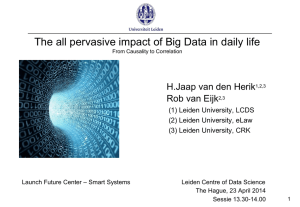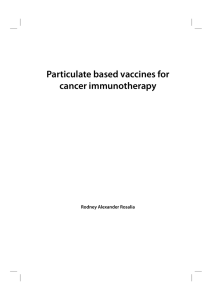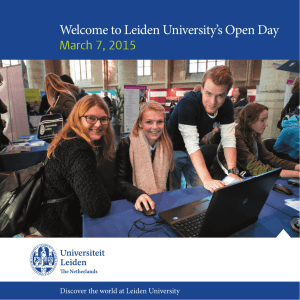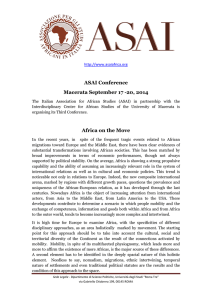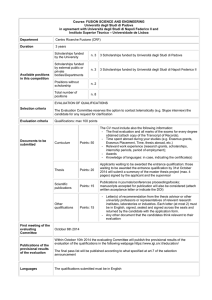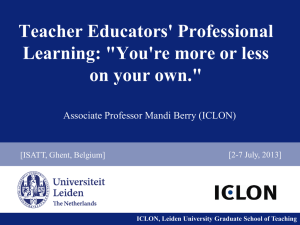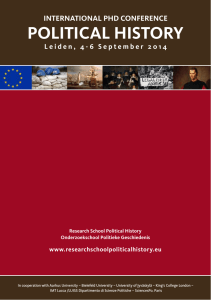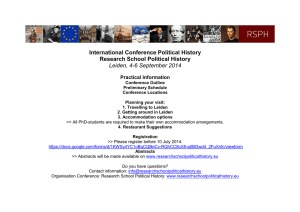programma Roma-Sendai-Leiden 2014 voor website
advertisement
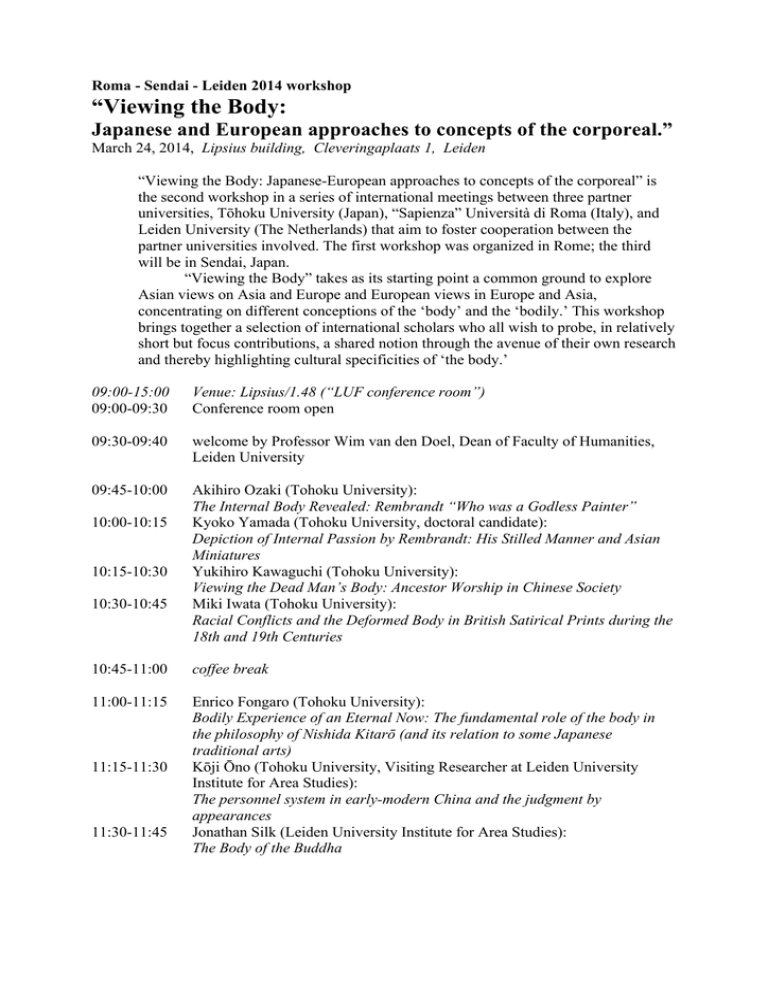
Roma - Sendai - Leiden 2014 workshop “Viewing the Body: Japanese and European approaches to concepts of the corporeal.” March 24, 2014, Lipsius building, Cleveringaplaats 1, Leiden “Viewing the Body: Japanese-European approaches to concepts of the corporeal” is the second workshop in a series of international meetings between three partner universities, Tōhoku University (Japan), “Sapienza” Università di Roma (Italy), and Leiden University (The Netherlands) that aim to foster cooperation between the partner universities involved. The first workshop was organized in Rome; the third will be in Sendai, Japan. “Viewing the Body” takes as its starting point a common ground to explore Asian views on Asia and Europe and European views in Europe and Asia, concentrating on different conceptions of the ‘body’ and the ‘bodily.’ This workshop brings together a selection of international scholars who all wish to probe, in relatively short but focus contributions, a shared notion through the avenue of their own research and thereby highlighting cultural specificities of ‘the body.’ 09:00-15:00 09:00-09:30 Venue: Lipsius/1.48 (“LUF conference room”) Conference room open 09:30-09:40 welcome by Professor Wim van den Doel, Dean of Faculty of Humanities, Leiden University 09:45-10:00 Akihiro Ozaki (Tohoku University): The Internal Body Revealed: Rembrandt “Who was a Godless Painter” Kyoko Yamada (Tohoku University, doctoral candidate): Depiction of Internal Passion by Rembrandt: His Stilled Manner and Asian Miniatures Yukihiro Kawaguchi (Tohoku University): Viewing the Dead Man’s Body: Ancestor Worship in Chinese Society Miki Iwata (Tohoku University): Racial Conflicts and the Deformed Body in British Satirical Prints during the 18th and 19th Centuries 10:00-10:15 10:15-10:30 10:30-10:45 10:45-11:00 coffee break 11:00-11:15 Enrico Fongaro (Tohoku University): Bodily Experience of an Eternal Now: The fundamental role of the body in the philosophy of Nishida Kitarō (and its relation to some Japanese traditional arts) Kōji Ōno (Tohoku University, Visiting Researcher at Leiden University Institute for Area Studies): The personnel system in early-modern China and the judgment by appearances Jonathan Silk (Leiden University Institute for Area Studies): The Body of the Buddha 11:15-11:30 11:30-11:45 11:45-12:00 12:00-12:15 Dr. Kiri Paramore (Leiden University Institute for Area Studies): Confucianism as Capitalism in Modern Japan: Private Property, the Public Body, Lust and Profit in the writings of Shibusawa Eiichi and Matsudaira Sadanobu Marco Del Bene (Istituto Italiano di Studi Orientali, “Sapienza” Università di Roma) The (sicken) body of the Nation: Individuality, State and the struggle for power in modern and contemporary Japan 12:30-13:30 lunch (at own costs). Venue: Faculty restaurant, Lipsius (ground floor) 13:45-15.00 13:45-14:00 Skype session with colleagues from Roma “La Sapienza” Renzo Bragantini (Dipartimento di Studi greco-latini, italiani, scenicomusicali, “Sapienza” Università di Roma) Disfigured and dismembered bodies in the Narrative of the Italian Renaissance Lorenzo Geri (Dipartimento di Studi greco-latini, italiani, scenico-musicali, “Sapienza” Università di Roma) Textual bodies and bodily texts: the metaphor of the body in the Italian Renaissance Lorenzo Verderame (Istituto Italiano di Studi Orientali, “Sapienza” Università di Roma) The value of the body in the Babylonian cosmogony Elisabetta Corsi (Dipartimento di Storia, Culture, Religioni, “Sapienza” Università di Roma) The Spread of Optical Science in China during the Early Modern Period: The Primacy of Vision in Xingxue cushu by Giulio Aleni, SJ Matilde Mastrangelo (Istituto Italiano di Studi Orientali, “Sapienza” Università di Roma) The ghosts’ body in Japanese Literature 14:00-14:15 14:15-14:30 14:30-14:45 14:45-15:00 15:00-16:00 15.00-15:05 15:10-15:25 15:25-15:40 15:40-15:55 15:55-16:05 16:05-16:10 16:10-17:00 Venue: Lipsius//0.02 change of venue: move to Lipsius/0.02 Marjan Groot (Leiden University Centre for the Arts in Society): The Rhetoricality of BioDesign Asghar Seyed-Ghorab (Leiden University Institute for Area Studies): The body of the beloved in Persian literature Harmen Beukers (Leiden University, Scaliger Institute): Philip Franz von Siebold and traditional Japanese medicine, with special reference to Leiden collections wrap-up walk to Rapenburg 25 (5 mins.) guided tour of Bibliotheca Thysiana (for participants), by Professor Paul Hoftijzer The Bibliotheca Thysiana on the Rapenburg canal (no. 25) in Leiden was founded by testament in 1653 by the young Dutch jurist Johannes Thysius. It is the only Dutch book collection from the seventeenth century that is housed in the original purposebuilt library. The collection contains some 2,500 books and several thousand pamphlets on a great variety of subjects. For more detail, see: http://www.library.leiden.edu/special-collections/rare/bibliotheca-thysiana.html
